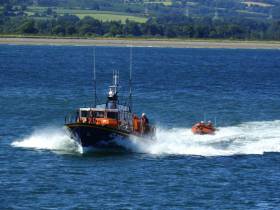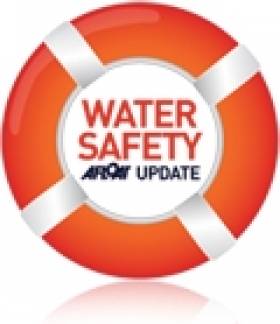Displaying items by tag: Brittas bay
#RNLI - Both Wicklow RNLI lifeboats were launched yesterday (Sunday 1 July) to assist two people on an inflatable dinghy near Brittas Bay beach.
The father and son had set off from the popular tourist beach to fish in a small inflatable dinghy but were carried offshore south around Mizzen Head with the wind and tide, and were having difficulties rowing back to land.
Fortunately, the father managed to get the dinghy ashore on an inaccessible beach after much effort.
Onlookers and family members were unable to get down the cliff to help them, so they waited until the inshore lifeboat came ashore at 5.30pm and was able to pick up the stranded man and son.
They were transferred to the all-weather lifeboat a short time later and assessed by lifeboat first aider Carol Flahive.
The Dublin-based Irish Coast Guard helicopter Rescue 116 was also tasked to the incident.
The two casualties were cold and shaken after their ordeal, but required no further medical assistance. They were landed safely back at Wicklow lifeboat station at 6.30pm and were picked up by relieved family members after having a hot drink.
Speaking following the callout, Wicklow RNLI volunteer lifeboat press officer Tommy Dover said: “We would remind everyone planning an activity at sea to always respect the water. Always wear a lifejacket or buoyancy aid. Always carry a means of calling or signalling for help.
“Check the weather and tide times before you go. Tell someone about your plans - where you intend to go and when you expect to return.”
Wicklow Lifeboats Launch To Swimmer In Difficulty At Brittas Bay Beach
#RNLI - Both Wicklow RNLI lifeboats launched yesterday afternoon (Sunday 24 September) to assist a swimmer in difficulty at Brittas Bay.
The Dublin-based Irish Coast Guard rescue helicopter, the local coastguard shore unit and an ambulance crew were also tasked to the incident at the popular tourist beach.
The first report stated the man was swimming a short distance off the beach, but further reports stated he managed to get ashore.
The inshore lifeboat crew located the man at the South end of Brittas Beach, where they administered initial casualty care and first aid until he was handed over to paramedics.
Speaking after the callout, lifeboat press officer Tommy Dover said: “Thankfully the swimmer was okay after his ordeal and required no further medical attention after being assessed by the paramedics.”
The crew on the callout with the all-weather lifeboat were second coxswain Ciaran Doyle, mechanic Tommy Murphy, Tommy McAulay, David O’Leary, Lisa O’Leary, Kevin Rahill and Terry Sillery. Crew with the inshore lifeboat were helm Dean Mulvihill, Ian Thompson and John Stapleton.
Lifeguards Compete in IWS National Beach Rescue Championships
#watersafety – After a busy Summer season, Ireland's top Lifeguards will compete in the IWS National Beach Rescue Championships at Brittas Bay, Wicklow tomorrow. (9am-5pm, Saturday 6th Sept.)
Competitors will gather from counties nationwide and will include lifeguards from Ireland's International Lifesaving Team who will compete in the World Lifesaving Championships in France on September 16th.
Competitors at the National Championships will have their skills tested in events that simulate emergency rescue scenarios.
Teams will fend off strong competition from the fittest Lifeguards nationwide - the most significant and breathtaking life saving competition in Ireland. Ireland's best Lifesavers will contend with the open water conditions at Brittas Bay coast to rescue potential "casualties" in testing swim races, rescue board races and other competitive events.
On average, 135 people drown in Ireland every year yet this figure would be far higher but for the actions of trained Lifesavers. Last summer for example, Lifeguards rescued nearly 900 people from drowning and reunited almost 1,000 children found wandering near water.
Commenting on the additional challenges of open water competitions, the Chairman of Irish Water Safety's Sports Commission, Seamus O'Neill is confident of each team's readiness for the challenge. "Athletes will not only compete with each other while using their life saving equipment but also with the open water conditions of Brittas Bay Beach as they vie for National Championship medals."
The Sport of Lifesaving has been developed to improve the standard of life guarding in Ireland. The skills they have honed will demonstrate that lifesaving skills are an important lifeline in an emergency.































































